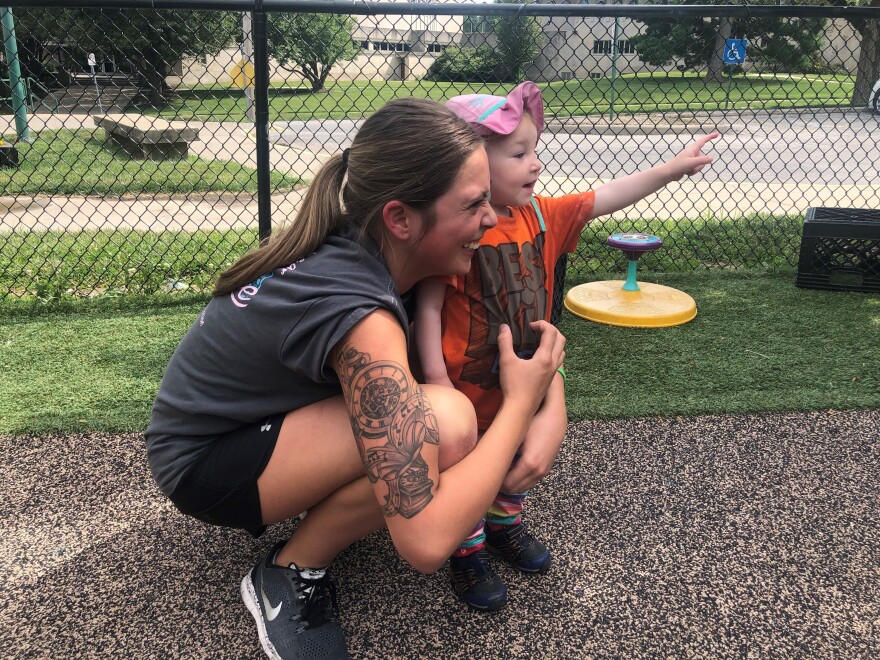Between the time they’re born and age 3, babies’ brains are literally mapping, making the connections they’ll need to learn later on.
In fact, 80 percent of a child’s brain develops in the first three years.
“It’s like a firework display on the Fourth of July,” says Paula Neth of the Family Conservancy in Wyandotte County. “When a parent sits and holds a child and reads a book, the fireworks in the brain of all the neuron connections just start happening.”
That’s why proponents of early childhood education in the Kansas City metro aren’t giving up on the idea of universal pre-K, even though Kansas City voters rejected a plan to pay for such services with sales taxes this spring.
Even in cities with robust public preschool programs – early learning advocates here like to point to Denver, which has had universal pre-K for 4-year-olds for a decade – the focus is almost exclusively on getting kids ready to start kindergarten.
But child development experts say the return on investment would actually be greater if kids had access to high-quality child care starting at birth instead of having to wait until age 4.
“Everyone wants to separate it,” says Polly Prendergast, the director of the Berkley Child and Family Development Center, a preschool on the University of Missouri-Kansas City campus that serves kids as young as 3 months. “‘Oh, no, now you’re school.’ Well, they're in school here. Do they have a classroom that they go to? Yeah. Do they have teachers? Yeah. Are they learning anything? Oh my God, yes.”
It frustrates Prendergast when policymakers and even parents undervalue what happens in a pre-K classroom.

“Our infants are building friendships,” she says. “You have to experience it. Our families say, ‘I thought you were crazy when I came on the tour and you told me that my infant has friends.’”
Who should pay?
But infants do develop relationships with their classmates and caregivers. Advancements in brain imaging have allowed scientists to see that type of brain activity in real time.
So why do civic leaders, politicians, advocates and educators focus on universal pre-K for 4-year-olds when the brain science says to start sooner?
“People are a little ambivalent,” Neth says. “They know the importance of the brain research, but they're ambivalent about whose responsibility are children under 2. Is that the family's responsibility? Is it the government's responsibility?”
Angela DeWilde is trying to answer some of those questions. She’s the executive director of Start at Zero, a nonprofit that connects Kansas City families with parenting resources.
Sometimes parents will call Start at Zero before their baby is even born.
“And we can start building that relationship right away,” DeWilde says.
DeWilde thinks that babies belong at home with their families, but that there many variables, that each family needs options, and that parents deserve support. That’s why Start at Zero parent educators try to reinforce what parents and caregivers are already doing well.
“When they meet with a family, they just point out, ‘Oh, look at the way you talked to the baby while you're changing their diaper. Do you see the way they're watching very closely, your face?’ So it's identifying the child development that is already happening,” DeWilde says.
Spending on early childhood education in Missouri lags behind other states. In 2018, only 1% of 3-year-olds and 2% of 4-year-olds were enrolled in state-funded preschool, according to the National Institute for Early Education Research.
Comparatively, 36% of 4-year-olds in Kansas were enrolled in state-funded preschool, which is about the national average.
Not giving up
The lack of state funding for early childhood education is one of the reasons outgoing Kansas City Mayor Sly James tried to get a pre-K sales tax passed in the spring. He argued that state lawmakers were never going to fund it, so if Kansas Citians wanted universal pre-K, they’d have to pay for it.
But voters rejected his plan.
One of the sticking points seemed to be how the $30 million the sales tax generated would be spent. More money was earmarked for facilities upgrades at preschools and day care centers than for tuition.
Yet early learning advocates say that kind of investment in infrastructure is badly needed. Jovanna Rohs, the director of early learning for the Mid-America Regional Council, says there aren’t enough pre-K seats in any county in the metro.

“It’s not as easy as saying, ‘Well, if we could just get the 4-year-olds funded,’” Rohs says “When we separate it into pre-K and infant-toddler, it makes it seem like it’s easy to divide.”
The school superintendents, who opposed the mayor’s pre-K plan, argued that K-12 schools were better positioned to serve 4-year-olds than the city’s preschools and daycares. But without 4-year-olds, a lot of the independent child care centers wouldn’t be able to stay in business, Rohs says, because they essentially subsidize the high cost of delivering infant-toddler care.
Still, early learning advocates say the issue is too important not to try again. Annie Watson of Turn the Page KC worked on the failed campaign. She says next time, early learning advocates need to do a better job of explaining why investing in young children is so critical.
“The reality is parents need child care,” Watson says. “They need those hours to be able to work, to be able to go to school, to be able to live their lives, knowing that their children are in a safe, educational environment. They need birth to 5.”
Editor's note: This story has been updated to clarify Angela DeWilde's views on the needs of families.
Elle Moxley covers education for KCUR. You can reach her on Twitter @ellemoxley.





